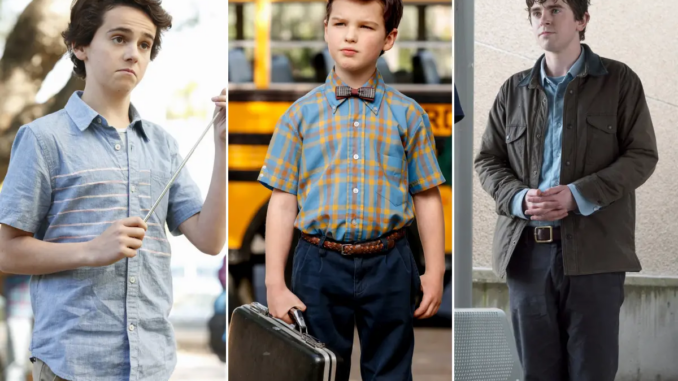
‘Young Sheldon’ and ‘The Good Doctor’: Exploring the Spectrum of Genius on TV
Television has long been fascinated with the idea of genius, often depicting characters whose intelligence sets them apart from the rest of society. But in recent years, shows like Young Sheldon and The Good Doctor have gone beyond the traditional portrayal of genius, offering viewers a more complex and diverse understanding of brilliance. Both series explore the lives of young, exceptionally gifted individuals, but they also highlight the challenges these characters face in navigating the social and emotional aspects of life. Through these two shows, we get a deeper look into how genius can come in many forms, each with its own set of strengths and struggles.
Young Sheldon, the prequel to The Big Bang Theory, follows the early life of Sheldon Cooper, a child prodigy who is not only intellectually gifted but also socially awkward and emotionally distant. Played by Iain Armitage, Sheldon’s incredible intellect often isolates him from his peers, making everyday interactions a challenge. From his advanced understanding of science to his struggle to fit in with his family and classmates, Young Sheldon offers a comedic yet poignant portrayal of the life of a child genius. The show focuses on Sheldon’s family dynamics, particularly how they support and struggle to understand his unique way of thinking. The series highlights how genius doesn’t just manifest in academics—it can also impact a person’s emotional growth and interpersonal relationships.

On the other hand, The Good Doctor introduces Dr. Shaun Murphy, a young surgeon with autism and savant syndrome. Played by Freddie Highmore, Shaun’s exceptional medical abilities often leave a lasting impression on those around him, but his difficulty with social cues and emotional interactions creates a constant tension in both his personal and professional life. Unlike Sheldon, Shaun is an adult navigating a highly demanding career in medicine. His journey is not just about overcoming the challenges of his condition but also proving that his genius is just as valid as that of his neurotypical peers. The Good Doctor delves deeply into themes of acceptance, both in the workplace and in society, offering a nuanced exploration of what it means to be “different” in a world that often values conformity.
Both shows highlight different aspects of genius, but they share a common theme: the exploration of how individuals with extraordinary abilities interact with the world around them. While Sheldon’s intellect manifests in his love for physics and his often-childlike behavior, Shaun’s genius is expressed through his exceptional skills in diagnosing and performing surgery. However, both characters face significant challenges in understanding the emotional language that governs much of human interaction. These struggles, though depicted differently, serve to make the characters more relatable and human, even as they excel in areas that most people can only dream of mastering.
The success of both Young Sheldon and The Good Doctor has brought attention to a more inclusive and diverse portrayal of intelligence on television. These shows not only entertain but also educate viewers about the complexities of neurodiversity and the many ways in which genius can manifest. By showcasing characters who are gifted but not necessarily socially adept, both shows encourage audiences to rethink what it means to be truly brilliant. They remind us that intelligence is not a one-size-fits-all concept, and that the challenges faced by those who think differently can be as compelling and inspiring as their successes.
Ultimately, Young Sheldon and The Good Doctor offer a spectrum of genius, from the child prodigy with a gift for science to the young doctor whose talents lie in healing. Through their stories, these shows explore the broader implications of being exceptional in a world that often values conformity and social adeptness. They provide a rich, layered look at what it means to be a genius—highlighting both the rewards and the challenges that come with extraordinary intelligence. In doing so, they make us reflect on our own perceptions of talent, ability, and the human experience.
